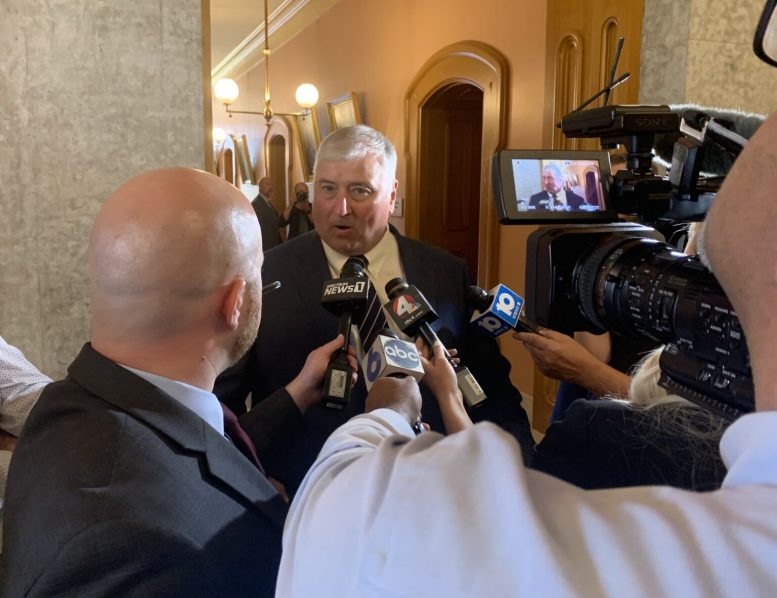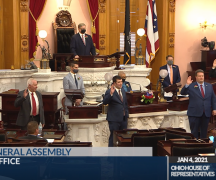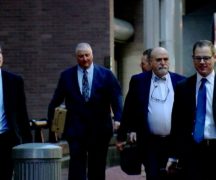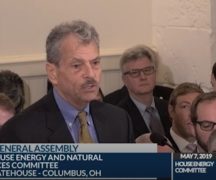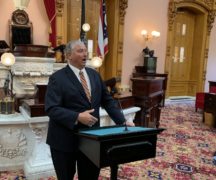Federal prosecutors indicated Wednesday they expect the public corruption trial of former House Speaker Larry Householder will take about six weeks and could occur sometime this coming fall.
Attorneys representing Householder and an alleged co-conspirator generally agreed a trial would take six weeks to leave time for jury selection and the parties to make their cases.
U.S. District Judge Timothy Black ordered the attorneys to meet privately to find a six-week block to set aside for the trial.
Meanwhile, pre-trial motions are due at the end of the month, which can shed light on what evidence will come up, who may be called to testify, and other nuggets in what prosecutors have described as the largest political corruption case in state history.
Householder, a Perry County Republican, is accused of secretly operating a purportedly independent nonprofit that channeled about $60 million from FirstEnergy Corp. Prosecutors say those funds were used for Householder’s personal enrichment; to elect a slate of GOP representative who would anoint him Speaker; and to engineer a political machine that engineered passage of a sweeping bailout, House Bill 6, worth an estimated $1.3 billion to FirstEnergy.
Alongside Householder, lobbyist and former state Republican Party chairman Matt Borges have pleaded not guilty and await trial.
Lobbyist Juan Cespedes and GOP political operative Jeff Longstreth pleaded guilty in the Fall of 2020. Lobbyist Neil Clark pleaded not guilty but died by suicide in early 2021.
FirstEnergy signed a deferred prosecution agreement (DPA) last summer — agreeing to a lengthy set of facts, paying a $230 million fine, and cooperating with the U.S. Department of Justice in exchange for the potential dismissal of one count of honest services wire fraud. The charge entails engaging in a scheme to “defraud the public of its right to the honest services of a public official through bribery or kickbacks.”
In the DPA, FirstEnergy admitted to making the payments and using the nonprofit, a 501(c)(4), to “conceal payments for the benefit of public officials and in return for official action.” It admitted to making the payments to ensure passage of HB 6, which provided electric customer-funded bailouts to two nuclear plants owned by the company’s then subsidiary. Another piece of the bill, known as “decoupling,” effectively forced ratepayers to guarantee FirstEnergy revenues against the risk of turbulence in energy markets.
The company also implicated Sam Randazzo, who Gov. Mike DeWine appointed in 2019 to serve as the state’s top utility regulator. FirstEnergy claimed it paid Randazzo $4.3 million shortly before he accepted the position in return for regulatory and legislative favors that saved the company millions. Randazzo has not been charged with a crime and has maintained his innocence. Text messages obtained by the Ohio Capital Journal show Randazzo also lobbied lawmakers to slip a provision into the state budget that proved lucrative for the company as well.
Lawmakers repealed the nuclear bailout and decoupling provisions of HB 6 last year. However, they left intact provisions of the bill that gutted the state’s renewable energy portfolio standards and its energy efficiency programs.
Another piece of the bill, providing hundreds of millions in electric customer-funded bailouts to utility companies who own two coal plants survived as well. The plants, one in Indiana and one in Ohio, are owned by the Ohio Valley Electric Corp. Thanks to HB 6, electric customers have paid $211 million since 2020 to American Electric Power, Duke Energy and AES Ohio to cover their losses on the plants.
***
Also from Ohio Capital Journal:
Groups say Ohio legislative maps still violate constitution; Redistricting commission has until Friday to respond
The newest maps approved by the Ohio Redistricting Commission remain unconstitutional and “grossly disproportionate,” according to objections filed by anti-gerrymandering groups.
The ORC now has until Friday to respond to three objections made to maps they adopted in a Saturday meeting last week, according to an Ohio Supreme Court directive released on Wednesday.
The League of Women Voters of Ohio, the Ohio Organizing Collaborative, and a group of private citizens led by state representative candidate Bria Bennett, all parties in court challengesto the original redistricting effort, filed individual objections.
“The Republican caucus map drawers used the unconstitutional plan as a template, tweaked it slightly, and presented a new plan that the commission once again adopted along party lines,” the OOC said in their objection to the new maps. “It remains unconstitutional.”
The ORC, of which there were five Republican members and two Democrats, had ten days to redraw maps that the Ohio Supreme Court found unconstitutional. READ MORE

